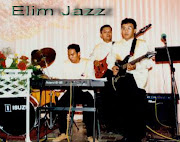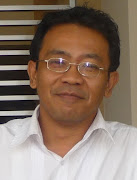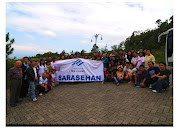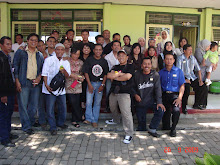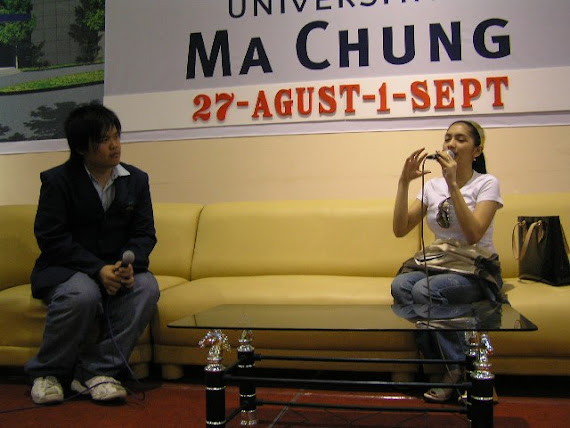
Abstract
Obama’s excellent public speaking is considered as one of primary factors that lead him to US presidency. Many critics say that Obama’s technique of using rhetorical devices is much like Cicero, a great orator of the ancient Rome, and hence Obama is labeled as the new Cicero of modern times. This paper aims at elaborating the rhetoric style of Presiden Barrack Obama on the day of his inauguration. Findings suggest that the rhetoric content of Obama’s speech reflects his philosophical view as populist and rational leader.
Key words: the rhetoric style, equality, inclusion.
Background
The year of 2009 is known as the political year, there were two big agendas to carry out the election of the members of the house and presidency. In addition, just for some days to come, the election of the House members is approaching. Looking back some weeks ago, it’s quite interesting to see how political parties designed their political agenda through advertisement in printed and electronic mass media as well as how much they have spent doing such things. They are willing to spend great amount of money; although, the efficiency of the publicity through advertisement in relation to the increasing number of voters are still open to debate. In fact, the total budget to do that political campaign was reported to be very costly, about 2.2 trillion rupiahs. Is it money? That’s what many people ask. Yes, it is money. When this money is used to build infrastructure, then many people may get benefit from it. If not, then the luckiest parties will be for a few parties such as printing press, paper factories and so on. Advertisement, speeches, documents and the like, as long as the language as medium of communication is concerned, are basically the texts which are inseparable with the rhetoric. As rhetoric, these kinds of texts are intended to please and convince people with the argument and the opinion.
However, many people, as frequently noticed in day to day life, are likely to use the word rhetoric in despairing tone such as itu kan hanya retorika saja...that’s only rhetoric, meaning that the topics or plans being discussed are not totally done nor really implemented. To some extent, it is because the issue a person is proposing is probably so ideal that it is impossible to carry on. Pessimism on the word rhetoric has historical traces as to how politics has significant influence on the changing face of that word. Ways back to some centuries ago, during the period of the ancient Greek rhetoric used to be a very important language skill for someone to win the argument before the public. Whether or not Spartan declared a war against Athenian was very much determined by how skillful someone’s argument was presented, how logically, rationally, and beautifully he spoke so that he could convince people. Knowing how important the role of the rhetoric was, people began to manipulate, to engineer and to use according to their interest, frequently neglecting the norms, logic, and moral conducts.
Aristotle once in his book “the rhetoric” states that there are at least three dimensions or aspects for people to consider if they want to have a good rhetoric. First of all, rhetoric demands ethos. Ethos is derived from the word ethikos meaning moral, showing moral character. To the Greek ancient and modern, the meaning is simply “the state of being”, the inner soul, the soul, etc. With ethos, good rhetoric is primarily viewed in terms of the character of the speaker. People judge whether or not the speech or the text someone is proposing is good, it is from the character of speaker, experience, track record, accomplishment, etc. Next is logos that means knowledge. With logos, someone is demanded that he must have sufficient knowledge of issues being discussed. This should be reflected in logical, rational argument supported by empirical evidences. The last is phatos. Phatos specifically deals with language. A good language understanding should be reflected not only in the use of grammatical arrangement of sentences, selection of diction of phrases and clauses that people can completely understand the message but more importantly also touches the emotion of the reader that people feel appreciated and liked.
Barrack Hussein Obama Phatos, as the 44th president of US, certainly has those prerequisite conditions as previously elaborated and demanded in Aristotle’s theory. Obama’s talent at public speaking is amazing that many people say his success at US presidency is much determined by this skill. He is even named as the new Cicero, a great Roman orator, because of his tactful capacity in using classical rhetoric techniques. He was officially inaugurated on January 2009, with special theme of ceremony namely a new birth of freedom. This was deliberatively chosen to remember the anniversary of Abraham Lincoln.
Based on his character, capacity, and horizon with the great accomplishment in the past, it is obviously justifiable that Obama’ ideas, feelings and thought found in their speeches deserve to be fully explored.
The Short Biography President Barrack Hussein Obama
Barack Hussein Obama was born Aug. 4, 1961, in Honolulu, Hawaii. His father, Barack Obama, Sr., was born of Luo ethnicity in Nyanza Province, Kenya. Obama’s mother, Ann Dunham, grew up in Wichita, Kansas. Meantime, Barack’s father had won a scholarship that allowed him to leave Kenya pursue his dreams in Hawaii. At the time of his birth, Obama’s parents were students at the East–West Center of the University of Hawaii at Manoa. Obama’s parents separated when he was two years old and later divorced.
Obama’s father went to Harvard to pursue Ph. D. studies and then returned to Kenya. His mother married Lolo Soetoro, another East–West Center student from Indonesia. In 1967, the family moved to Jakarta, where Obama’s half-sister Maya Soetoro–Ng was born. Obama attended schools in Jakarta, where classes were taught in the Indonesian language. Four years later when Barack (commonly known throughout his early years as "Barry") was ten, he returned to Hawaii to live with his maternal grandparents, Madelyn and Stanley Dunham, and later his mother (who died of ovarian cancer in 1995). He was enrolled in the fifth grade at the esteemed Punahou Academy, graduating with honors in 1979. He was only one of three black students at the school. After high school, Obama studied at Occidental College in Los Angeles for two years. He then transferred to Columbia University in New York, graduating in 1983 with a degree in political science. Obama entered Harvard Law School in 1988. In February 1990, he was elected the first African–American editor of the Harvard Law Review. Obama graduated magna cum laude in 1991. After law school, Obama returned to Chicago to practice as a civil rights lawyer, joining the firm of Miner, Barnhill & Galland. He also taught at the University of Chicago Law School.
In February 2007, Obama made headlines when he announced his candidacy for the 2008 Democratic presidential nomination. He was locked in a tight battle with former first lady and current U.S. Senator from New York, Hillary Rodham Clinton until he became the presumptive nominee on June 3, 2008. On November 4th, 2008, Obama defeated Republican presidential nominee John McCain for the position of U.S. President. He is now the 44th president of the United States. Obama met his wife, Michelle, when he was a summer associate at the Chicago law firm of Sidley & Austin. They were married in October 1992 and live in Kenwood on Chicago's South Side with their daughters, Malia and Sasha.
The Summary of Obama’s Inaugural Speech
Obama thanks people for their trusts so that he becomes the new President of USA. In addition, he thanks President Bush for his service and cooperation. Obama states the importance of being loyal to the ideal of forbearers and the founding documents since they can make American stand and exist up to now. Obama says that America is now facing great challenges which are real and many such as weak economic, jobs, homes, schools costs, the inappropriate use of energy. However, with commitment and hard work they can meet the problems.
It is time for them to change, to set aside childish behavior. People need to reaffirm their enduring spirit to make their dreams come true, to pursue full measure of happiness. Attaining that ambition is not that easy. This need good character of the people who are willing to be the risk takers, doers, great quality of personality as shown in the long trace of US history. People in the past risked their life so that their hard work will bear fruits prosperity and freedom for the next generation: packing up their few possessions and travelling across oceans, toiling in sweatshops and settling in the West; enduring the lash of the whip and plowing the hard earth, fighting and dying in places like Concord and Gettysburg; Normandy and Khe Sahn. Later Obama also says that there is work to be done: The state of the economy not only by creating new jobs, but also laying a new foundation for growth, building the infrastructure, making use of science, improving the health care and cost, and schools, college programs.
Obama also says that there is no need to be pessimistic if America cannot do that. This history has proved what this country has already done; what free men and women can achieve when imagination is joined to common purpose, and necessity to courage. Big or small government is no longer appropriate but that it can generate jobs, and extend economy is much more important. In addition, managing the public's dollars by spending wisely, reforming bad habits need to be done as part of public accountability. Obama says that the success of the economy depends not just on the size of our gross domestic product, but on the reach of the prosperity; on the ability to extend opportunity to every willing heart--not out of charity, but because it is the surest route to our common good.
He says that America is a friend of each nation and every man, woman. In fact, it is a nation of people of different religions, Christians and Muslims, Jews and Hindus--and non-believers. He also speaks to the leaders of different nations. America is willing to work and establish a good relationship with any nation. He also mentions that for the world has changed, and Americans must change with it. With hope and virtue, American must brave to face all difficulties during the icy currents, and endure what storms may come. American must carry forth the great gift of freedom and deliver it safely to future generations.
Words
There are about 2392 words in Obama’s speech. About 1926 words fall into the first category (2000 most frequently used words), 203 into the second (2001 -5000 most frequently used words) and 263 into the third category (not included in the first and the second category). The duration of Obama’s speech lasts for 18 minutes and 58 seconds. In his speech, Obama has used the personal pronoun I as many as three times while mentioning 60 times of the personal pronoun we.
The tabulation of President Obama's Speech
The Total of the words 2392
Words in the 2000 Most Frequent List 1926
Number of words in the 2001-5000 most K List 203
Number of words not in either list 263
Duration 18 minutes 58 seconds
The number of the personal pronoun I 3
The number of the personal pronoun we 60
Involvement
Involvement means a connection of inclusion or the condition of sharing in common with others (as fellows or partners etc.). By involvement, there is the sense of egalitarianism where both speaker and hearer have no social barrier as, for example, to call each other’s first name in initial encounters whether the interaction is between relative equals or those in a hierarchical relation. In the same way, involvement is the attitude reflected in Obama’s speech. Obama addresses his audiences with my fellow citizens. According to Webster Dictionary that word implies the sense of being of the same kind, group, occupation, society, or locality; having in common certain characteristics or interests. Obama feels that there is barrier and gap between his audience and himself. According to its history, the ancestor of the word fellow definitely referred to a business partner. Fellow was borrowed into English from Old Norse, meaning "a partner or shareholder of any kind." Again Old Norse is derived the former word meaning "partnership.
The evidence of inclusion in the speech is obviously demonstrated by the use of the first plural personal pronouns, we, our and us as compared to the first singular personal pronouns, I. In Obama’s case, he has used the word I three times and once the word my in his 2390 word speech. There are more than 120 words of inclusive personal pronouns such as we, us and our altogether. What do these words all mean? The frequent of we which is greater than I in the case of Obama implies a clear message of how he positions himself towards his fellow citizens. It is no longer about your problem and my problem, it is not about your happiness and my happiness, but it is indeed about our happiness and our problems.
Figurative Language
There are some rhetorical techniques he uses in the speech such as tricolon in combination with anaphora, tricolon in combination with Ephipora, Methapora and polysindenton. Tricolon is a sentence in which there are three equal parts, usually independent clauses. Tricolon is a powerful writing technique that is concise yet explanatory. Julius Cesar once used this kind of technique as found in his famous expression veni, vidi, vivi (I came; I saw; I conquered). Anaphora, on the other hand, is emphasizing words by repeating them at the beginnings of neighboring clauses. In Obama, this technique is seen in the following example:
For us, they packed up their few worldly possessions and traveled across oceans in search of a new life.
For us, they toiled in sweatshops and settled the West; endured the lash of the whip and plowed the hard earth. For us, they fought and died, in places like Concord and Gettysburg; Normandy and Khe Sahn.
The next technique is tricolon in combination with ephipora. Ephipora or ephistrope is a figure of speech and the counterpart of anaphora. It is the repetition of the same word or words at the end of successive phrases, clauses or sentences. It is an extremely emphatic device because of the emphasis placed on the last word in a phrase or sentence.
The time has come to reaffirm our enduring spirit, to choose our better history, to carry forward that precious gift, that noble idea, passed on from generation to generation: the God-given promise that all are equal, all are free, and all deserve a chance to pursue their full measure of happiness.
Next is metaphor. Metaphor is a figurative language that functions to compare one thing with another thing which has the same quality or characteristic. In Obama’s speech, metaphor can be found in the following lines:
the rising tides of prosperty, still water of peace, gathering clouds and raging storms. rising tides of prosperity and the still waters of peace. Yet, every so often, the oath is taken amidst gathering clouds and raging storms.
Next figurative speech in Obama’s speech is polysindenton. Polysindenton is a figurative speech where the author repeatedly uses the conjunction in the clauses. In Obama’s speech that kind of figurative language can be seen in the following example:
We are a nation of Christians and Muslims, Jews and Hindus--and non-believers. We are shaped by every language and culture, drawn from every end of this Earth; and because we have tasted the bitter swill of civil war and segregation, and emerged from that dark chapter stronger and more united, we cannot help but believe that the old hatreds shall someday pass…
CONCLUSIONS
1. Aristotle in his book “the rhetoric” states that there are at least three dimensions or aspects of rhetoric ethos, logos and phatos. With ethos, good rhetoric is primarily viewed in terms of the character of the speaker. Logos that means knowledge. With logos, someone is demanded that he must have sufficient knowledge of issues being discussed. This should be reflected in logical, rational argument supported by empirical evidences. The last is phatos. Phatos specifically deals with language. A good language understanding should be reflected not only in the use of grammatical arrangement of sentences, selection of diction of phrases and clauses that people can completely understand the message but more importantly also touches the emotion of the reader that people feel appreciated and liked.
2. There are about 2392 words in Obama’s speech. About 1926 words fall into the first category (2000 most frequently used words), 203 into the second (2001 -5000 most frequently used words) and 263 into the third category (not included in the first and the second category). The duration of Obama’s speech lasts for 18 minutes and 58 seconds. In his speech, Obama has used the personal pronoun I as many as three times while mentioning 60 times of the personal pronoun we.
3. The strong sense of equality in Obama’s speech is, among other, reflected in frequent use of the personal pronoun we, the use of the title my fellow citizens.
4. There are some rhetorical techniques Obama uses in the speech such as tricolon in combination with anaphora, tricolon in combination with Ephipora, Methapora and polysindenton.
References
Chih-Hua Kuo (2000/11). "Politeness Strategies in Scientific Journal Articles, "in Proceedings of the Ninth International
Symposium on English Teaching, Taipei, English Teachers' Association, 401-410.
Hondo, Junko; Goodman, Bridget. Cross Cultural Varieties of Politeness. Texas Papers in Foreign Language Education; v6 n1
p163-170 Fall 2001. 2001
Nakajima,Yuko (1997) Politeness Strategies in the Workplace: Which Experiences Help Japanese Businessmen Acquire
American English Native-like Strategies? Working Papers in Educational Linguistics, v13 n1 p49-69 Spr 1997
Miller, Christoper. Etiquette and Politeness in Human-Human and Human-Machine Interactions: Summary of Work at SIFT
www.computer.org/portal/cms_docs_intelligent/intelligent/homepage/2008/X4-08/x4mil.pdf -
Terkourafi, Marina (2005).Beyond the micro level in Politeness Research. Journal of Politeness Research. 237-262
www.wikipedia.com
